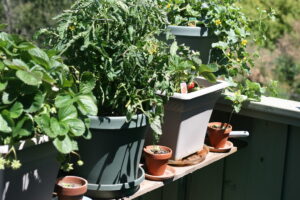
Key Benefits at a Glance
-
Biochar improves soil health, leading to more vibrant and nectar-rich flowering plants.
-
Using biochar can enhance the fragrance and bloom size of flowers, attracting beneficial pollinators.
-
It helps in creating an ideal soil environment with better pH balance, water retention, and drainage.
-
Biochar boosts plant resilience against pests and diseases, ensuring healthier growth.
-
Simple application techniques of biochar make it easy to incorporate into any garden setup.
Unlocking the Power of Biochar in Your Garden
Imagine stepping into a garden where the air is sweet with the scent of blooming flowers, and each plant is a beacon of health, teeming with vibrant colors. This is not just a dream; it’s a reality you can achieve with the magic of biochar. As gardeners, we’re always seeking ways to enrich our gardens, and biochar is a secret ingredient that can transform your green space into a lush paradise.
Why High Nectar Flowering Plants Love Biochar
High-nectar flowering plants are the heart of any garden, drawing in a symphony of pollinators with their sweet offerings. These plants are not just about beauty; they are vital for biodiversity. But to truly thrive and produce the nectar that bees, butterflies, and hummingbirds crave, they need a special kind of care. Biochar provides that care, by enhancing soil properties, which in turn, supercharges the growth and nectar production of these floral wonders.
| Plant Name | Flower Color | Flower Shape | Preferred Pollinators | Typical Bloom Period |
|---|---|---|---|---|
| Torch Lily | Red, Orange, Yellow | Spiky | Hummingbirds | Summer to Fall |
| Bee Balm | Pink, Red, Purple | Tubular | Bees, Butterflies, Hummingbirds | Summer |
| Lavender | Purple, Blue, Pink, White | Spiky | Bees, Butterflies | Late Spring to Early Summer |
| Spider Flower | White, Pink, Purple | Unique spider-like shape | Bees, Butterflies | Summer to Fall |
| Salvia | Red, Purple, Blue | Tubular | Bees, Hummingbirds | Spring to Fall |
| Catmint | Blue, Purple | Tubular | Bees | Late Spring to Early Fall |
| Beardtongue | Red, Pink, Purple | Tubular | Hummingbirds | Late Spring to Early Summer |
| Fuschia | Pink, Purple | Pendulous teardrop | Hummingbirds | Summer to Fall |
Boosting Flower Bloom and Fragrance
One of the most delightful aspects of gardening is witnessing the burst of color and perfume that flowers bring. With biochar, you can take this sensory experience to the next level. But how does biochar work its magic? It’s all about the soil.
What Is Biochar?
Biochar is a carbon-rich substance made from organic matter that’s been heated in a controlled environment with little to no oxygen—a process known as pyrolysis. This black, porous, and lightweight material might look unassuming, but it’s a powerhouse when it comes to improving soil quality and plant health. It’s like giving your garden a multivitamin that slowly releases essential nutrients over time.
Nectar Production and Biochar: A Sweet Relationship
For flowers to produce nectar, they need certain nutrients, and they need them in the right balance. Biochar enriches the soil with a slow release of nutrients, ensuring that your high-nectar plants have a consistent supply of what they need to create their sweet elixir. Because of its porous nature, biochar acts like a sponge, holding onto nutrients and water, which are then available for the plants to absorb over time.
Moreover, biochar’s structure provides a home for beneficial microorganisms that play a role in breaking down organic matter into nutrients that plants can use. With biochar, you’re not just feeding your plants; you’re nurturing an entire ecosystem below the ground.
Supercharging Scents: Biochar’s Aromatic Advantage
Besides that, the fragrance of a flower is intimately tied to its health and the richness of the soil it grows in. When you infuse your garden’s soil with biochar, you’re ensuring that your flowers are not only more robust but also more fragrant. The better the conditions for growth, the more energy plants can devote to producing oils and compounds that make up their unique scents. This not only makes your garden more attractive to humans but also to pollinators, which rely on these scents to locate their next meal.
Creating the Ideal Soil Environment
The foundation of a flourishing garden is the soil. It’s the bedrock that supports the intricate web of life, both above and below the surface. But not all soil is created equal. Some soils are too acidic, while others are too alkaline. Some retain water like a sponge, others drain it away too quickly. This is where biochar comes in, acting as a soil amendment that creates the ideal environment for your high-nectar flowering plants to thrive.
Perfecting pH: How Biochar Balances Soil
Soil pH can make or break a plant’s ability to absorb nutrients. Most high-nectar plants prefer a soil pH that’s slightly acidic to neutral. Biochar can be the great equalizer here, as it often has a neutralizing effect on soil pH. If your soil is too acidic, adding biochar can help raise the pH to a more plant-friendly level. Conversely, if your soil is too alkaline, biochar can help lower it. This balancing act is crucial for nutrient uptake, which in turn, fuels nectar production.
Remember, it’s not just about dumping biochar into the soil and hoping for the best. You need to test your soil’s pH first, then add biochar accordingly. A soil test kit from your local garden center can be a handy tool in your gardening arsenal.
Water Retention and Drainage: Biochar’s Dual Role
Water is life, and in the garden, the right amount of water is essential. Too much and your plants’ roots can rot; too little and they can wither and die. Biochar helps manage this delicate balance by improving soil structure. Its porous nature allows it to retain water during dry spells, releasing it slowly to the plants as needed. But it also improves drainage, preventing water from pooling around roots during heavy rains.
This dual role is particularly important for high-nectar flowering plants, which often require consistent moisture to produce their nectar. With biochar, you’re giving your plants a reservoir to draw from, ensuring they stay hydrated and healthy.
Enhancing Plant Health and Resilience
Strong, resilient plants are the goal of every gardener. Not only do they look better, but they’re also better equipped to deal with the challenges that nature throws their way. Biochar can be a powerful ally in building this resilience.
Pest Resistance: Biochar’s Barrier Benefits
When plants are stressed, they’re more susceptible to pest invasions. Biochar helps alleviate this stress by improving soil health, which in turn supports stronger plant growth. Healthy plants can more effectively fend off pests, acting as a natural barrier to infestations. This means you’ll have to spend less time worrying about aphids, mites, and other garden nuisances.
Moreover, biochar can directly impact certain pests by disrupting their habitat. For example, biochar in the soil can make it more difficult for soil-borne pests to locate their plant targets. This is not a silver bullet, but it’s certainly a useful tool in your integrated pest management toolbox.
Disease Defense: How Biochar Strengthens Immunity
Just like humans, plants have an immune system, and biochar can give it a boost. A healthy soil microbiome, supported by biochar, means that beneficial bacteria and fungi that protect plants from pathogens can thrive. These microorganisms can outcompete or even consume harmful pathogens, reducing the incidence of disease in your garden.
This enhanced disease resistance is especially important for high-nectar flowering plants, which can be prone to fungal infections due to their sweet secretions. By using biochar, you’re helping to protect these plants from the inside out, promoting a garden that’s not only beautiful but also robust.
How to Use Biochar in Your Garden
Now that you understand the benefits of biochar, you’re probably wondering how to use it in your garden. The good news is, it’s quite simple.
Getting Started: Biochar Application Techniques
First, you want to ensure you’re using a high-quality biochar. Look for products that are specifically designed for garden use. Once you have your biochar, there are a couple of ways to apply it to your garden:
-
Mix biochar directly into the planting holes when setting out transplants.
-
Blend biochar with your compost or soil mix before spreading it over your garden beds.
-
For established plants, gently work biochar into the soil around the base of each plant.
It’s important not to overdo it. A little goes a long way. A general recommendation is to use about 1 pound of biochar for every 10 square feet of garden bed. However, always refer to the instructions on your specific biochar product for the best results.
Mixing Matters: Combining Biochar with Compost
One of the most effective ways to use biochar is to combine it with compost. The biochar will absorb some of the compost’s nutrients and beneficial microbes, becoming ‘charged’ with goodness. When you add this mixture to your soil, it’s like giving your plants a slow-release, nutrient-rich supplement.
To mix biochar with compost, simply add biochar to your compost pile or bin at a ratio of about 1 part biochar to 10 parts compost. Let the mixture sit for a few weeks, turning it occasionally, before using it in your garden. This waiting period allows the biochar to fully integrate with the compost, ensuring that your plants get the maximum benefit.
Planting for Pollinators
Attracting pollinators to your garden is about more than just having pretty flowers. Pollinators are essential for fruit and vegetable production, and they play a critical role in maintaining biodiversity. High-nectar flowering plants are a magnet for these important creatures, and biochar can help you create a haven for them.
Choosing the Best Plants for Pollinator Attractions
When selecting high-nectar flowering plants, aim for a variety that blooms at different times throughout the growing season. This ensures a constant food source for pollinators. Some excellent choices include lavender, bee balm, sunflowers, and zinnias. Consider also the color, as bees are particularly attracted to blue, purple, and yellow flowers. Incorporating biochar into the soil where these plants grow will not only boost their nectar production but also support the overall health of the pollinators that visit them.
Biochar’s Role in Supporting a Healthy Ecosystem
Biochar doesn’t just benefit individual plants; it supports the entire garden ecosystem. By enhancing soil health, it creates a more resilient environment that can better withstand the impacts of climate change and human activity. A healthy ecosystem is more productive and can support a wider range of wildlife, from the smallest soil microorganisms to the birds and bees that visit your garden.
Frequently Asked Questions (FAQ)
Can Biochar Be Used with All Types of Plants?
Yes, biochar is versatile and can be used with a wide range of plants, including vegetables, fruits, and ornamentals. However, it’s important to understand the specific needs of your plants and adjust the application rate accordingly. Some plants may benefit from more biochar, while others may require less.
How Often Should I Apply Biochar to My Garden?
Biochar is a long-lasting soil amendment, and its effects can persist for several years. Typically, a one-time application is sufficient for up to 4-5 years. However, if you notice that your soil’s quality is declining or your plants aren’t performing as well, you can consider a top-up application. Remember, it’s better to start with a smaller amount and observe how your plants respond before adding more. This cautious approach will prevent you from upsetting the balance of your soil’s ecosystem.
Will Biochar Affect the Color of My Blooms?
Biochar itself does not directly affect the color of your blooms. Flower color is primarily determined by genetics and the presence of specific pigments within the plant. However, biochar can indirectly influence bloom color by improving the overall health of the plant and ensuring that it has access to the necessary nutrients that can enhance pigment intensity and vibrancy. For instance, the presence of trace elements like magnesium, which is crucial for chlorophyll production, can affect the green hues in your garden, indirectly influencing the contrast and appearance of your flower colors.
How Does Biochar Impact Soil Microorganisms?
Biochar has a generally positive impact on soil microorganisms. Its porous structure provides a habitat for beneficial microbes to flourish, which can improve soil fertility and plant health. These microorganisms play a crucial role in nutrient cycling, breaking down organic matter, and protecting plants from pathogens. However, it’s essential to note that the specific effects of biochar on soil microorganisms can vary depending on the type of biochar used, its application rate, and the existing soil conditions.
Research has shown that when biochar is added to soil, there is an increase in microbial activity, which can lead to enhanced decomposition of organic matter and increased nutrient availability for plants.
Is Biochar Safe for Organic Gardening?
Yes, biochar is safe for organic gardening. It is a natural product made from biomass and does not contain synthetic chemicals. It can help organic gardeners by reducing the need for chemical fertilizers and pesticides. Biochar’s ability to improve soil health aligns with the principles of organic gardening, which emphasize the importance of maintaining ecological balance and building natural soil fertility. Before purchasing biochar, ensure it is certified for organic use to guarantee that it meets the standards set by organic certification bodies.



